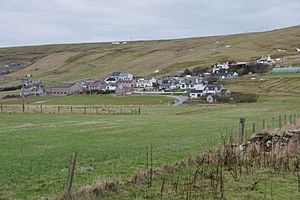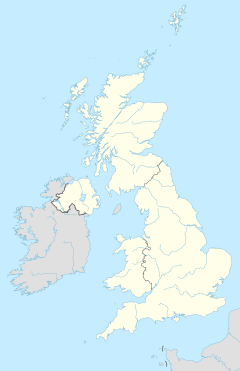Hoswick facts for kids
Quick facts for kids Hoswick |
|
|---|---|
 Hoswick viewed from Stove |
|
| OS grid reference | HU414238 |
| Civil parish |
|
| Council area | |
| Lieutenancy area | |
| Post town | SHETLAND |
| Postcode district | ZE2 |
| Dialling code | 01950 |
| Police | |
| Fire | |
| Ambulance | |
| UK Parliament |
|
| Scottish Parliament |
|
Hoswick is a small village located in the south of Shetland, Scotland. It's part of the Sandwick area and sits on the eastern side of the Dunrossness parish. The village is known for its history, especially its connection to fishing and a famous legal case involving whales!
Hoswick is separated from the rest of Sandwick by the Hoswick Burn, which is a small stream. To the south, a hill separates it from the village of Channerwick.
Contents
History of Hoswick
Hoswick likely started as a fishing village. People would dry and cure fish right on Hoswick beach. Later, many villagers worked at a nearby fishing station called Broonie's Taing. This station was very busy in the early 1900s but became less active by the late 1930s.
After World War II, Hoswick became known for making Shetland tweed fabric. This industry ended in the 1980s. Today, the Hoswick Visitor Centre, which has a cafe and museum, is located in one of the old weaving sheds. A person named L.J. Smith helped grow the tweed industry. He also built a large knitwear business that used many home knitters in Hoswick.
The name "Hoswick" comes from an old Norse word, Hausvík. It means "skull," possibly because of the steep hills nearby.
The Hoswick Whale Case
The people of Hoswick are famous for a legal case that happened in 1888. During the annual whale drive, they managed to bring about 340 whales ashore. However, the landowner, John Bruce Jnr, claimed a third of the profits. This was a custom under an old law called Udal Law. This law said that the whale catch should be split three ways: one share for the leader, one for those who drove the whales, and one for the landowner where the whales landed.
The villagers of Hoswick disagreed with Bruce's claim. The case went to court in Edinburgh in 1889. The judge, Sheriff MacKenzie, sided with the Hoswick residents. He said that Bruce's claim wasn't old enough, consistent enough, or continuous enough to be valid. Bruce appealed the decision in 1890 but lost again. After this, no other landowners in Shetland tried to claim a share of whale catches.
The 2003 Flood in Hoswick
On September 19, 2003, Hoswick experienced a severe flash flood. Heavy rains caused a lot of damage to the village. Many buildings were affected, and eleven houses were flooded, forcing two families to leave their homes.
The flood also destroyed the Hoswick bridge and washed away a large part of the beach. Fresh water supplies were cut off because two kilometers of water pipes were destroyed. For several days, the community had to rely on bottled water.
Notable Buildings in Hoswick
Hoswick has several interesting buildings that are worth seeing:
- Hoswick Visitor Centre - This center has a cafe and a gift shop. You can also see exhibits about weaving, learn about local history, and view a large collection of old radios. The building used to be a Shetland Tweed weaving shed. It's also home to the Sandwick History Group.
- Hoswick Woollen Mill - This is a working factory and shop. It houses Laurance Odie Knitwear. The company started in 2004 after another company, Laurence J. Smith Ltd, closed down in the same building.
- Neilanell Design Studio - This is a boutique and design studio. It's owned by Neila Nell, a textile designer who lives in Hoswick.
- Orca Country Inn - This building used to be called the Barclay Arms Hotel. It's a three-star guest house and a bar.
You can also see many traditional two-story croft houses in Hoswick. These houses usually have two or three windows on the front and are very typical of this area.
 | May Edward Chinn |
 | Rebecca Cole |
 | Alexa Canady |
 | Dorothy Lavinia Brown |


